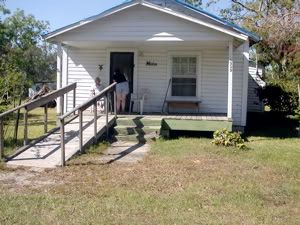 After four different routes, I’ve settled into ERV 1166 on Long Beach C. We’re part of the five-ERV contingent which serves Long Beach, a working-class community adjacent to Gulfport. It’s on the other side of the tracks (literally) from the devastation on the beachfront, but still suffered a lot of destruction. There wasn’t much flooding, but many homes are badly damaged, with fallen trees, crushed porches, holes in roofs, etc. Some homes are abandoned, some have been condemned by the authorities, and many people are living in FEMA trailers or tents — often in their own front yards.
After four different routes, I’ve settled into ERV 1166 on Long Beach C. We’re part of the five-ERV contingent which serves Long Beach, a working-class community adjacent to Gulfport. It’s on the other side of the tracks (literally) from the devastation on the beachfront, but still suffered a lot of destruction. There wasn’t much flooding, but many homes are badly damaged, with fallen trees, crushed porches, holes in roofs, etc. Some homes are abandoned, some have been condemned by the authorities, and many people are living in FEMA trailers or tents — often in their own front yards.
My driver Bill and I have been together on this route going on ten days or so. For some reason we have not been able to hold on to a second support person. It’s been kind of amazing how many different folks have passed through our ERV: Ron, Jen, Marty, David, Etta, Mark, Patty, and now Steven, whose last work day is Friday, so I’ll have at least one more person to train before my deployment is done. We’ve had people get sick, we’ve had folks on their last day, we’ve had people from HQ who wanted to ride on an ERV (she got car-sick riding around in the back)—we even had an a-hole who I requested get transferred off.
Long Beach C is a small network of streets mostly made up of single-story, single-family homes, with a couple of small two-story “apartment buildings” sprinkled between. Like the VFW Communities I worked on my first ERV ride, this is a very integrated neighborhood, with white folks, black families, and even a couple of Vietnamese households, living all amongst each other. The kids play with each other, the moms all watch out for their neighbors’ kids. I’m sure I’m romanticizing it, but it’s seems like a real community, a word we use a lot but here has a real meaning.
We also serve the typical allotment of work crews, roofers, phone repairmen, and other laborers who are everywhere you look all over this area. Oddly enough, this neighborhood also houses a contingent of retarded guys who are regular clients. (Do we still use that term, “retarded”? One the guys is a total Rain Man type. Wayne is about 40, often is shirtless, and walks randomly around the neighborhood until he finds us. “Two dinners. Thank you very much.” Without fail.)
The Long Beach routes are out all day, leaving K-35 at about 10 a.m. and not returning until 7:30 p.m. or so. We get re-supplied for supper in the field. Some time between 2 and 3:30 after our lunch run, we all meet at the rendezvous point (a select spot right on Route 90 in the heart of the disaster zone), and a box truck shows up from the kitchen with our dinner Cambros, additional snacks and drinks, and other stuff we need. In exchange for that, we give them our empties, garbage, and flattened boxes, which the box truck returns to the kitchen. It’s nice to not have to clean our lunch Cambros, but it simply means we get working sooner, preparing snack bags for dinner, and setting out for the three-and-a-half hour dinner run at about 4-o’clock.
Once that’s over and we’re back at the kitchen, it’s about an hour of cleaning the ERV and preparing it for the next day’s run (as well as helping other ERVs get squared away). Invariably, I catch the last shuttle back to SeaBee base, and often don’t get here until 9:30 p.m.
I usually serve meals for the lunch run and do the window for dinner (or “supper,” as they call it here). I put out a lot of energy when I sit at the window, chatting with folks, asking after older family members, bantering with the kids, and generally being friendly, and I’ve found that I just can’t handle expending that much adrenaline all day. The upside is that I’ve become a regular on this route, and everybody knows me, even asking about me on my day off, but the downside is that I sometimes feel afraid of letting people down, of not being as emotionally present and friendly as they’ve become accustomed to.
I’ve really grown to love this neighborhood and the people who live here. We’ve got 85-year-old Alma Felton, who I bring the meal to personally because she can’t walk too well. We’ve got Alma’s daughter (also named Alma), and her husband. We’ve got Miss Lucy Mae, an elderly blind lady whose retarded son often gets the meals and always asks to borrow a pen. There’s the “three old ladies,” as they call themselves. One of them, Ann, left for Texas the other day and she gave me a hug and a kiss goodbye. Another one of the old ladies (also named Ann) just today gave us a delicious loaf of corn bread, fresh from the oven, which we gobbled down right there in the ERV. Then there’s Ted, an old skinny guy with cartoon-sleepy eyes and a Gilligan hat. And his niece Rhonda, who’s a real sweetie and always give us our snack bags back so we can use them again for other folks. And of course ten-year-old Nick, who comes to the window every day with the greeting, “What’s up, Josh? Whatch’all serving tonight?”
The meals our kitchen serves are all-American delights: hot dogs, meatloaf, turkey, beef stew, pork chops, BBQ sandwiches, chicken cutlets, ravioli, salisbury steak: all the stuff I love to eat. I admit to having eaten the meals myself when I get too hungry or I know we won’t have time for a proper lunch before the resupply truck arrives. The trick is to eat the food when the smell still entices you, and not after two hours when the closeness of it is enough to make you toss cookies.
I’d never worked food service before, but now I’m an expert. I know which order to load the Cambros so it’s most efficient to serve. I know which utensils speed or slow down the process. I know to balance the snack bags with salt and sweet items. I know how to tell, by what percentage of the route we’ve covered, whether or not to double up on portions or hold some back to make sure we have just enough to finish our route.
There’s no way I can overstate how incredible this experience has been for me. Despite the pressure and the seemingly endless days, it’s been one the most fulfilling things I’ve ever done. I’ll always be able to look back on this period as a time that I really did make a difference, that I helped real people with real issues, with matters of life and sustenance. That’s not hyperbole — I have people telling me that they don’t have anything to eat that day until we show up, that they still don’t have gas for cooking or running water, that their appliances were ruined and had to be thrown out, that the government only gives them $10 a day for food stamps.
These neighborhoods have no infrastructure left, few convenience stores, no restaurants. Not to mention that many people are now out of work, or at spending all their money trying to rebuild their property, or waiting for their Section 8 homes to be repaired. The last thing many of them have time to do is worry about where their next meal is coming from. And that’s what the Red Cross is there for. I don’t want to hear any more criticism of how the organization spends its donated dollars; right here, where the rubber meets the road, vital work is being done.
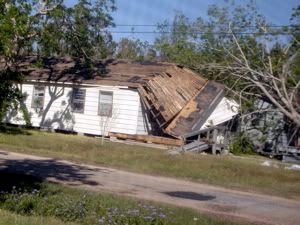
[ a house in the ‘hood]
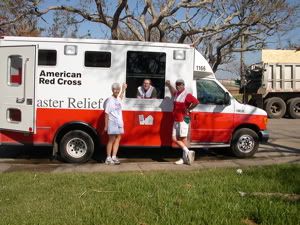
[Marty, me, and Bill]
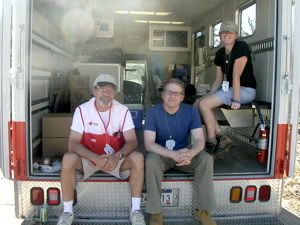
[Bill, me, and Jen]
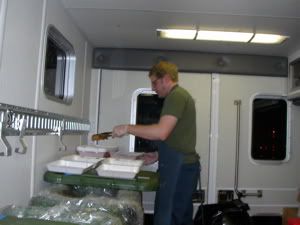
[slinging meatloaf]
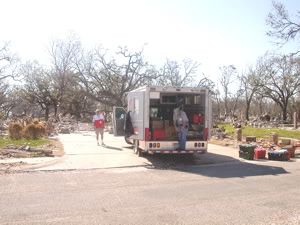
[at the re-supply area on Route 90 (with Bill and Ron)]

dude
you have done a good thing. When you leave you will miss it. There will always be more chances to help.
Speaking of a-holes getting transferred, man, we met a few REAL maniac volunteers during our time down there. Some real fuck ups…
Re: dude
yeah, it boggles the mind some of the people who come down here with their own screwed-up agendas, with chips on their shoulders, and a sense of entitlement about about their role, or the way things are managed (or mis-managed). some people are constitutionally unable to put aside their own egos to serve a larger purpose.
so it begs the question: why did they go through this to get deployed? and why did their local chapter deploy them?
I’ve been waiting for you to write about the heart of your journey now that 2-weeks have gone by. I envy your experience and I’m humbled by your dedication to help people in dire need. Your reportage has been outstanding. I’m curious if this experience will change the way you respond to the troubles that occur in NYC and stuff closer to home?
thanks, dino. i’ve been trying to get this entry down for almost a week now, but i never had enough time to put it all together until last night (which meant another night of less-than-enough sleep).
i’m also curious about how this will change me, and whether i’ll be motivated to respond to local disasters as well. the scale is so different, of course. unless, god forbid there’s another 9-11. i DO want to take a first aid/CPR class; so that’s something sari and i will probably do.
you should join us!
You’re doing an ubelievable job toggling relief efforts with reportage. No sleep ’til Brooklyn!
I might could learn me some CPR. That’s when you get to kiss the ladies when they faint, right?
Gee, I’m worried about my own personal ball of crap! Thanks for the slap in the face!!! When you get back to NYC I hope I can buy you a drink and trade some art and hear more stories. Awesome.
it DOES put things in perspective, though at the same time, it’s perfectly legitimate to worry about one’s own “ball of crap” as well. no slap intended!
i look forward to a get-together and telling you anything more you’d like to know
Rock On
You Rock man,
An Inspiration.
I was pointed your way by my friend and I must say I really appreciate all that you’ve done to help out those in need. I really wanted to go down and help out but since I was about 7 months pregnant when Katrina hit, there’s really not much I could do. I just moved here to SC about a year ago but the previous 7 years were spent in Pass Christian. I have tons of friends down there, some of which had to relocate because they had no house left. Thank you for helping those that needed help. Thank you for doing what I wanted to do but am still unable to do… The world needs more people like you.
Adrian, thanks for your kind words. The way I feel about it is, if it couldn’t be you, then it was me. If it wasn’t me, it would have been someone else. For some reason, I just felt compelled to help — my fellow Americans, my fellow human beings. And it was so inspiring, that first day I went to my Red Cross orientation/training, to see so many different people — black, white, and Asian; young & old — there to volunteer as well.
Did you have your baby? I hope you and he/she are healthy and well.
Nope, I still have about 3 weeks til I’m due.
I still think the world needs more people like you. Now that you’re back home, do you still kind of wish you’d been sent to Nola or are you glad you were sent to Long Beach?
after visiting New Orleans and seeing the situation there, i think i was able to do more good in Gulfport/Long Beach. i mean, basically, there aren’t any residents left in New Orleans, other than in the Quarter and other parts of Uptown/the wealthier areas.
one of the best things about the work in Gulfport was seeing the community starting to rebound during the time i was there. things were a heck of a lot better when i left than when i came — in some part thanks to the Red Cross.
hey you
I’m from Newton, MS(in east central MS) and I just wanted to say thanks. You’re awesome. 🙂
Re: hey you
shucks! thank you!
p.s. i nicknamed one of the girls on the route i served “the rowdy cowgirl” ‘cuz of a shirt she was wearing one day. every day when i’d see her, i’d say, “hey, it’s the rowdy cowgirl!” she was about 12. she loved it.